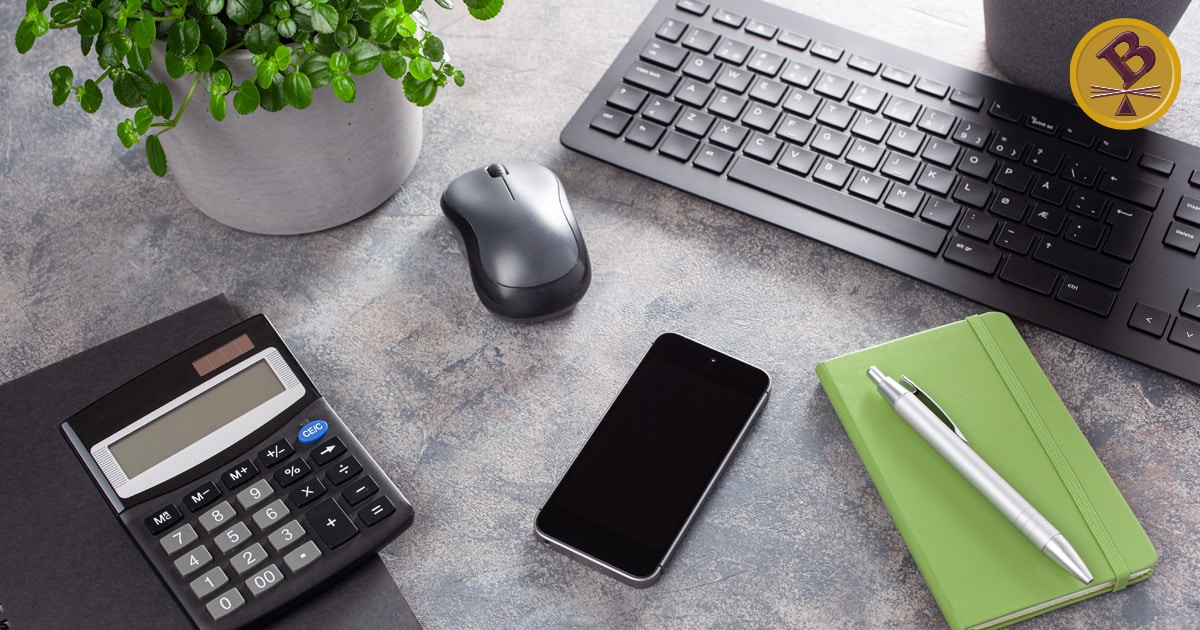Are you getting ready to complete your annual tax return? Have you ever wondered, are home office supplies tax deductible and what are office expenses for tax deduction?
Maybe you have office expenses but are unsure how they differ from office supplies. If you have a home office, what is the difference between expenses, supplies, and the cost of goods sold?
These are all great questions, and if you are filling out your tax return and all the schedules and forms that go with it yourself, you are likely going to come across these questions along the way. You might wonder what is considered to be personal expenses versus business expenses.
To best determine if home office supplies are tax-deductible, learn the difference between the various costs and expenses you have in running your business.
What are Considered to Be Home Office Supplies?
Home Office Supplies
Many items are considered to be home office supplies per the IRS (Internal Revenue Service). Traditional home office expenses include paper clips, binder clips, highlighters, pens, paper, USB thumb drives, pencils, printer ink, notepads, and other office supplies that are used up by yourself or your employees for business purposes.
Other items that are part of conducting business that count as home office supplies include toilet paper, tissue paper, snacks and beverages for the break room, paper plates, plastic utensils, janitorial supplies, postage, and other items you may use when working from home or working at an office building.
Cost of Goods Sold
When it comes to certain expenses like postage for shipping goods sold, large or small business owners must classify them as the cost of goods sold (COGS) on their annual tax return.
The Difference Between Home Office Supplies and Home Office Expenses
It’s important to note that office supplies are different from office expenses. Office expenses include items used to run your business. If you’ve taken business classes, you might remember business expenses that are operating expenses. These are considered to be office expenses per the IRS.
Other Home Office Expenses
Office expenses might include website hosting fees, website maintenance fees, the cost of one’s domain name, other website services (Dropbox, Google Shared Drive, Grammarly, etc.), software (QuickBooks, Microsoft Office, etc.), office telephones, cellular phone expenses as related to business, and other office expenses.
Home Office Assets
Other office equipment like an office chair, desk, computer, or file cabinet is considered to be business equipment. These items must be categorized as assets on your tax return and then depreciated over the period of time that is the life of the asset.
Home vs. Business Expenses
If you work from home, the lines between what is a home office deduction and what is a personal-use item can be blurry. Your home phone is something you could not deduct as an office expense because it is used for personal usage. To be a deductible expense, the item must be used for business purposes.

The interest on the mortgage of your office is an example that is considered to be tax-deductible for the tax year you are filing, but it only counts for the percentage of your home that is used for business purposes.
If you have a business property, mortgage interest would be 100% deductible, but if you work from home, you are likely going to have to use only the percentage that pertains to your office.
Are Home Office Supplies Tax Deductible?
As mentioned, if they were used for business purposes, you will be able to deduct the cost you paid for the items that are used in your home office. The main criteria to determine if something is tax deductible in relation to your home office is whether you use the item for business purposes or personal use.
How to Take the Home Office Supplies Tax Deduction
Tax deductions included as part of the home office deduction must be used for business. To be considered as business expenses, your items must be “ordinary” and “necessary” per the IRS. That means other people who are in your line of work would use these items as part of the normal running of their business.

Because determining what part of the home office deduction is can be tricky, it’s best to work with a qualified tax accountant, consultant, or expert – someone who understands tax law and the rules and regulations established by the IRS. They would understand tax deductions and how to deduct home office supplies on your tax return.
While it is highly recommended you work with a tax professional when doing your business taxes, you can fill out the schedules and forms yourself. Sole proprietors and other business owners would want to use IRS Schedule C on Line 18 to list their office supplies. Learn more about using IRS Schedule C.
Partnerships and other business owners would show office supplies on their tax returns as other deductions on IRS Form 1065: U.S. Return of Partnership Income on Line 20. Corporations would use IRS Form 1120: U.S. Corporation Income Tax Return and list office supplies as “Other Deductions;” this would be done on Line 26.
The only way that you can deduct office supplies on your tax return is if you keep adequate records showing when the items were purchased. If you undergo a tax audit, you will want to have the right documents showing what you have purchased as part of running your business.
Learn more about how to take the Home Office Deduction.
Conclusion
You should now have a solid idea of what home office supplies are, the difference between business use and personal use, and how to deduct home office supplies on your annual tax return.
Likely, you will still have questions, as this topic can be rather confusing. At Borshoff Consulting, the expertise is unmatched. You can rest assured knowing that Sherry Borshoff, Indiana’s tax expert, will complete your tax return the right way. This means that you will not have to worry about having your taxes done incorrectly!
Be sure to book a free consultation with Sherry Borshoff today to determine how she can best meet your needs!





